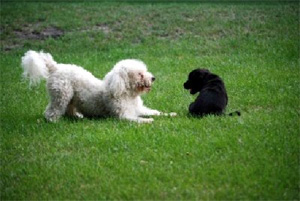It is generally agreed upon by animal behaviorists that the first three months of a puppy’s life is the critical stage when socialization happens. This is the period when sociability outweighs fear and is the primary window of opportunity for puppies to adapt to new people, animals and experiences. Incomplete or improper socialization during this important time can increase the risk of behavioral problems later in life including fear, avoidance, and/or aggression. Behavioral problems are the primary reason dogs are surrendered to shelters and these behavioral issues are the number one cause of death for dogs under three years of age.
 For this reason, the American Veterinary Society of Animal Behavior believes that it should be the standard of care for puppies to receive such socialization before they are fully vaccinated. This means exposing your puppy safely to as many new people, animals, stimuli and environments as possible.
For this reason, the American Veterinary Society of Animal Behavior believes that it should be the standard of care for puppies to receive such socialization before they are fully vaccinated. This means exposing your puppy safely to as many new people, animals, stimuli and environments as possible.
Even though puppies’ immune systems are still developing during the early months of life, the combination of maternal immunity, primary vaccination and appropriate care make the risk of infection relatively small compared to the chance of death from a behavioral problem. Behavioral veterinarians recommend that owners take advantage of every safe opportunity to expose young puppies to the great variety of stimuli that they will experience in their lives. Enrolling in puppy classes prior to three months of age can be an excellent means of improving training, strengthening the human-animal bond, and socializing puppies in an environment where the risk of illness can be minimized.
How to Socialize
Puppies should be handled from birth, learning to accept manipulation of all body parts. Every effort should be made to expose them to as many different people, well-socialized animals, situations, places, etc. as possible. Puppies should be encouraged to explore, investigate, and manipulate their environments. Interactive toys and games, a variety of surfaces, tunnels, steps, chutes, and other stimuli can enrich the puppy’s environment. Puppies should accompany their breeders/owners on as many car trips as possible, especially to places that can be considered “fun”.
Puppy socialization classes can offer a safe and organized means of socializing puppies and more quickly improve their responsiveness to commands. Each puppy should have age appropriate vaccinations, generally at least two distemper/parvo vaccine boosters, one bordetella booster, as well as a de-worming, and be disease and parasite free before entering the class.
Owners should be encouraged to introduce their puppies to other animals and people in safe and controlled environments. For instance, letting puppies play in the home with friends dogs who have been vaccinated is strongly recommended, as long as the play periods are supervised by the owners.
However, taking a puppy to dog parks that are not sanitized and/or are highly trafficked by dogs of unknown vaccination or disease status should be avoided. The same can be said for taking a puppy to a pet store and allowing it to roam freely on the ground. Instead, owners can place puppies in shopping carts where they are off the ground and not at risk of coming into contact with sick or unvaccinated dogs.
Classes and at-home training should be based on positive reinforcement with frequent rewards, praise, petting, play and/or treats. Positive and consistent training is associated with fewer behavioral problems and greater obedience than methods that involve punishment and/or encourage human dominance.
Early and adequate socialization and programs of positive training can go a long way to preventing behavior problems and improving bonding between humans and dogs. While the first three months is the most important socialization period in a puppy’s life, owners of puppies that have passed this milestone are strongly encouraged to continue to socialize their puppies to as many people, pets , and locations as is practical.

